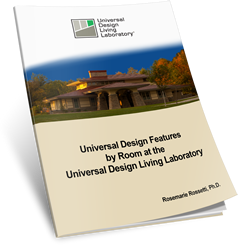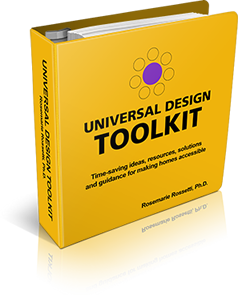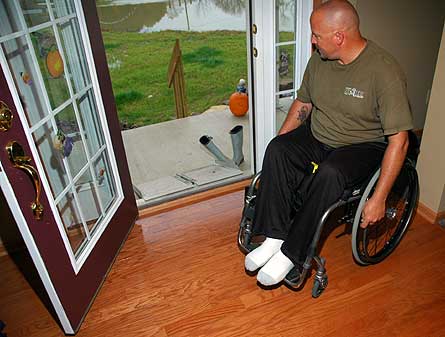
Discover how to live at home more affordably -- with independence, safety and dignity.
Get a sneak-peek at the "Universal Design Toolkit" with this free chapter filled with advice, tips and money-saving resources!

Build your awareness of what universal design features should be incorporated into homes.
Get the newly released "Universal Design Tookit", based on this real life demonstration home.

|
|
Article:
Housing Grants Available to Veterans and Active Duty PersonnelAction Magazine
May 2007
By Rosemarie Rossetti
and Brian Bixler
Copyright © 2007 Rosemarie Rossetti
Publication copyright © 2007 United Spinal Association
|

Iraq War veteran Mark Mix at the door of his new universal design home, built with a grant from the Department of Veterans Affairs.
In the last several issues of Action, from January through April 2007, this column has featured the universal design features of the home of Mark and Jasue Mix. Since Mark is a veteran, wounded in active duty in Iraq, he qualified for a $50,000 grant through the U.S. Department of Veterans Affairs (VA), to fund the construction of his new home in Warsaw, Ohio.
In order for veterans and some active duty personnel to qualify for housing grants, it is important to understand each of the three grant programs that are available to assist veterans with severe disabilities and active duty personnel in adapting housing to meet their special needs: Specially Adapted Housing (SAH), Special Housing Adaptation (SHA), and Temporary Residence Assistance (TRA). New legislation that went into effect June 2006 changed the manner in which grants can be used.
Veterans and active duty personnel may use the grants on a variety of plan types: 1) adaptation of a current home, 2) construction of a home on newly purchased land or land he or she already owns, or 3) reduction of the principle mortgage balance of a home he or she already owns, or is purchasing, if the home meets all of the VA minimum property requirements for the SAH program. In addition to grant funds, veterans and active duty personnel eligible for the SAH program may qualify for a Veterans’ Mortgage Life Insurance (VMLI) program covering the unpaid principle, not to exceed $90,000, on a mortgage loan.
Administered by VA’s Loan Guaranty Service, the assistance provided is in the form of monetary grants for the adaptation of homes under the SAH grant program. Veterans, and some active-duty active duty personnel, who have specific service-connected disabilities may be entitled to these grants. The goal of this program is to provide a barrier-free living environment, which affords the veteran or active duty personnel a level of independent living that he or she may not have otherwise enjoyed.
Veterans and active duty personnel entitled to a grant will receive a Notice of Eligibility once VA issues a Medical Rating Decision. A personal interview is then conducted with the veteran or active duty personnel to discuss the benefits offered under this grant program and to learn more about his/her housing needs.
The foremost grant—the SAH grant—is available to eligible veterans and active duty personnel who have suffered severe service-connected injuries that preclude maneuvering without the aid of prostheses, braces, crutches or a wheelchair. This grant is also available to veterans and active duty personnel who have suffered the loss, or loss of use, of both upper extremities above the elbow. The SAH grant is currently limited to an aggregate maximum amount of $50,000 and is generally used to create a wheelchair accessible home, including wider door and hallways as well as accessible bathrooms with roll in showers. Other adaptations may also be approved by VA.
A second grant—the SHA grant—is generally used to assist eligible veterans and active duty personnel who have suffered the loss, or loss of use, of both upper extremities below the elbow, or visual impairment in both eyes. This grant is currently limited to an aggregate maximum amount of $10,000 and is used to assist with mobility throughout the home, such as special lighting, handrails, security systems, and correction of safety defects. Other adaptations may also be approved by VA.
A third grant—the TRA grant—was recently created for eligible veterans who are or will be temporarily residing in a home owned by a family member. Veterans eligible for an SAH grant are permitted to use up to $14,000 on the modifications of a family member’s home and those veterans eligible for an SHA grant are permitted to use up to $2,000. It is important to note that active duty personnel are currently not eligible for TRA grants.
Enacted on June 15, 2006, Public Law 109-233, the Veterans Housing Opportunity and Benefits Act of 2006, significantly changed the manner in which veterans and active duty personnel may use both SAH and SHA grants. Under this new law, a veteran or active duty personnel is permitted to use his or her grant up to three times. However, the aggregate amount of assistance provided cannot exceed the current maximum grant amounts. Veterans and active duty personnel who used their grant prior to the enactment date, but at less than the current maximum amounts, may be entitled to the remaining funds for additional adaptations to their current home or to another home.
Since its inception in 1948, over 34,000 veterans have benefited from the SAH grant. VA has SAH agents located throughout the United States and it’s territories to assist severely injured veterans and active duty personnel. To learn more about the Specially Adapted Housing Grant Program and how to apply for a grant, please call VA’s toll-free telephone number 800-827-1000 or visit VA’s Internet at www.homeloans.va.gov/sah.
Brian Bixler is Chief of Specially Adapted Housing, Department of Veterans Affairs. Rosemarie Rossetti, Ph.D. is building a national model universal design home in metropolitan Columbus, Ohio. She is an internationally known speaker, trainer, consultant, and writer. To contact Rosemarie go to: www.RosemarieSpeaks.com. To learn more about the Universal Design Living Laboratory go to: www.UDLL.com.